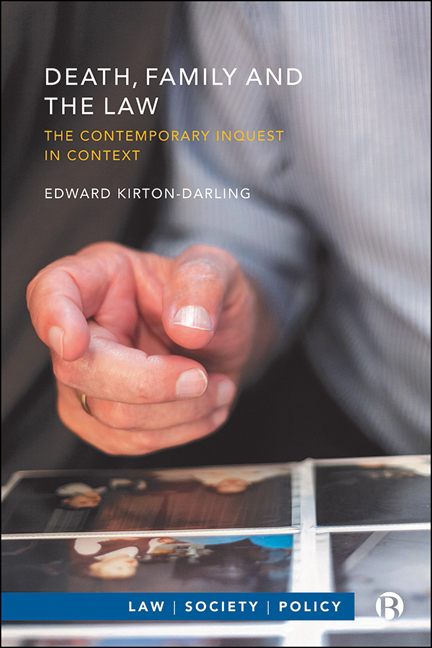Book contents
- Frontmatter
- Contents
- Acknowledgements
- Series Editor’s Preface
- 1 Death, Family and the Law
- 2 Accountability and Authority in the Historical Jurisdiction
- 3 Accountability Reconceived
- 4 First Contact and the Next of Kin
- 5 Dignity, the Family and the Body
- 6 Family in the Driving Seat
- 7 The Public(?) Hearing
- 8 Reimagining the Inquest
- Bibliography
- Index
7 - The Public(?) Hearing
Published online by Cambridge University Press: 08 October 2022
- Frontmatter
- Contents
- Acknowledgements
- Series Editor’s Preface
- 1 Death, Family and the Law
- 2 Accountability and Authority in the Historical Jurisdiction
- 3 Accountability Reconceived
- 4 First Contact and the Next of Kin
- 5 Dignity, the Family and the Body
- 6 Family in the Driving Seat
- 7 The Public(?) Hearing
- 8 Reimagining the Inquest
- Bibliography
- Index
Summary
Introduction
In this final substantive chapter I examine the ways in which my interviewees perceive the family's engagement with the construction of the public space of the inquest hearing. My contention is that the reforms of the inquest have produced a hearing which can be substantively more or less public in terms of what is covered and who is there to listen, and the family play a central role in determining how it is shaped. To explore this issue, I examine the different spaces in which inquests take place, before exploring order, disorder and the role of lawyers. I then move to discuss the ways in which the hearing can be more or less public in more detail, before concluding with a focus on the emphasis of meaningfulness in both the hearing and conclusions of the inquest. This conclusion (formerly verdict) receives a great deal of attention, particularly in doctrinal law, in relation to the appropriate legal tests for particular conclusions, as well as concerns with inconsistencies between areas in relation to conclusions (Mclean 2015a, 2015b, 2017; Harris and Walker 2019). Formal outcomes are undoubtedly important, including for the family, but as Davis et al note, ‘arriving at a correct verdict is a small part of what goes on in the inquest’ (Davis et al 2002, 60). Drawing on Scott Bray's insight that ‘ “facts” found by Coroners are not unproblematic findings’ (2010, 574) and can only be understood in their wider social and legal context, my endeavour here is to reflect on that wider context. In particular, I explore questions of how those facts emerge from a process which concludes in a public hearing, and how family fit into that.
A public space
One of the aims of the 2009/ 2013 reforms was to have fewer inquests, with the ability to discontinue an investigation before the inquest where, for example, the death was a result of natural causes and there were no other concerns (CJA 2009, s 4). Where an inquest was to be held, the Chief Coroner has emphasized that the ‘more modern look’ of the inquest system is based on fewer delays and more hearings being held in public (see Chief Coroner 2013– 14, 11).
- Type
- Chapter
- Information
- Death, Family and the LawThe Contemporary Inquest in Context, pp. 148 - 175Publisher: Bristol University PressPrint publication year: 2022



